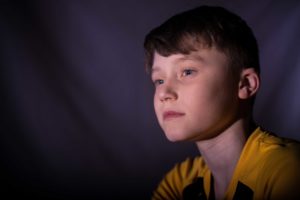Sexual abuse is an incredibly difficult subject to address. It affects many people and can be a source of deep-rooted pain, shame, and emotional strife. As part of combating sexual abuse, it is vitally important for parents and guardians to be able to recognize the tell-tale signs exhibited by an abused child. We must be constantly vigilant about the safety of children in this area.
Sexual offenders may look very different to what you might expect, and thus it is absolutely essential that parents know the key facts about the characteristics of those who may seek to do harm to your child. Both you and your children should be constantly vigilant of any strange behavior and be sure to report anything suspicious.
Common Signs of Sexual Abuse in Children
 Here are some of the most common signs that a child is being, or has been, abused:
Here are some of the most common signs that a child is being, or has been, abused:
Sleep Disturbances, Disturbing Dreams, Flashbacks, and Memories of the Assault
Children who have been abused will often experience problems with sleeping. It is common for victims of sexual abuse to have horrible night terrors. Others may have unexpected flashbacks of the experience. They may constantly think about the assault, and this is likely to make it very difficult for them to concentrate in school. Indeed, it may become extremely hard for them to think about anything else.
PTSD Symptoms
There is a common misconception that post-traumatic stress disorder is limited to military service members. However, modern research has proven that this is not the case.
People who have experienced a traumatic event may be emotionally “triggered” by various stimuli that will cause them to feel increased levels of stress, anxiety, and panic. Triggers may include things such as smells, sights, songs, movies, and people who look like, act like, sound like, or remind them of the offender. Panic attacks are also extremely common in those who have suffered abuse.
Becoming Very Quiet
If your child is usually vocal and energetic but has suddenly become withdrawn and quiet, it is time to do some investigating.
An Increase in Fear and Anxiety
A spike in fearful and anxious behavior is a common sign that a child may be being abused. They may become hypervigilant and be on constant lookout for danger. These emotions may become worse and more intense as bedtime approaches.
Fear of Intimacy
Relationships may be extremely difficult to maintain for an abused child. They may be unable to trust anyone and might start anticipating being hurt by anyone they become vulnerable with. Intimacy may be extremely difficult for them to engage in. They may refuse to participate in simple forms of affection, such as hugging, out of a fear of what the person might do.
Depression
 Kids who have been sexually abused may become depressed and experience periods of low mood. Subsequently, they may experience a high level of suicidal thoughts and even attempt to take their own life. Those of a slightly older age may begin to wear dark clothing, engage in cutting, self-inflicted wounds, or other types of self-mutilation. These are all things that must be looked out for.
Kids who have been sexually abused may become depressed and experience periods of low mood. Subsequently, they may experience a high level of suicidal thoughts and even attempt to take their own life. Those of a slightly older age may begin to wear dark clothing, engage in cutting, self-inflicted wounds, or other types of self-mutilation. These are all things that must be looked out for.
Overly Emotional, Tearfulness, and Detachment
Being overly emotional is normal for children who have suffered serious trauma. However, as they get older they may become hardened, harsh, or stern. They may eventually become completely detached, feeling as if it was someone else who experienced the abuse. A lot of dissociative disorders may begin during this period and may affect victims into later life.
Increased Aggression, Agitation, and Anger
Trust issues may develop, and victims may start to feel as if the whole world is against them.
They may begin to feel aggressive and hostile towards non-abusing parents. Children may develop a sense of resentment toward their parents: “Why didn’t you protect me?” they may ask. Heated arguments can become common.
Hurt, Guilt, and Shame
Victims may also feel an overwhelming sense of guilt and shame as if the abuse was their fault. The abuser may have reinforced this and convinced the child that the abuse was their own doing – they may even propose the narrative that the victim enjoyed it. The abuser may also threaten the victim with violence should they decide to tell someone about the abuse.
Sexual Promiscuity or a Repulsion to Sex
 It’s quite common for children who have experienced sexual abuse to experience a strong aversion to sexual contact. However, others will go in the opposite direction and will become highly promiscuous, offering sex to many causal partners. The Illinois Coalition Against Sexual Assault (ICASA) found that 57% of the women who were working as prostitutes reported being sexually abused as children.
It’s quite common for children who have experienced sexual abuse to experience a strong aversion to sexual contact. However, others will go in the opposite direction and will become highly promiscuous, offering sex to many causal partners. The Illinois Coalition Against Sexual Assault (ICASA) found that 57% of the women who were working as prostitutes reported being sexually abused as children.
Sexual Acting Out
Children who have been sexually abused can be rather forward, or even aggressive, when it comes to sex. Their behavior will often go beyond the regular “I’ll show you mine if you show me yours” that is experienced by schoolchildren as they develop. This may become an issue when it becomes clear that the motive of the abuser is related to power, control, and dominance.
Advanced Level of Knowledge About Sex
Children who have experienced abuse often possess detailed and advanced knowledge about sex that goes way beyond that of their peers.
Odd Forms of Play
Children who have been victims of abuse may exhibit strange forms of play. For example, they might act out with their dolls, even depicting them as having sex. This should be concerning to parents and immediate help should be sought.
Excessively Crude or Sexualized Language
This is a difficult one to judge. In our day and age, children are often familiar with sexual language at an increasingly young age. However, if a young child is clearly delving into pornography and taking much of the language into their everyday conversations, then an issue may have arisen.
Increased or Decreased Appetite
Kids who have been abused often find that their appetites will fluctuate drastically. They may not feel like eating that much or might find themselves eating excessively.
The development of certain eating disorders is very common among those who have suffered abuse. They may go so far as to starve themselves or start perceiving their body in a distorted way. Conversely, they may gorge on food as a coping mechanism as they deal with the trauma of their past abuse.
Attention Seeking, Dropping Hints, and Being Evasive
Attention seeking may become a key characteristic exhibited by those who have suffered abuse. They may drop hints as to their abusive past as a way of attempting to express their emotional turmoil and pain. However, they may quickly switch to evading contact with those around them and may withdraw from any meaningful relationships.
Disturbing Forms of Creative Expression
 Often you will see the suffering of a child’s life expressed through the things they choose to create. As an adult, you should pay close attention to any drawings, paintings, or other artwork of a dark, disturbing, or sexual nature.
Often you will see the suffering of a child’s life expressed through the things they choose to create. As an adult, you should pay close attention to any drawings, paintings, or other artwork of a dark, disturbing, or sexual nature.
Also pay attention to signs that appear in stories, poems, songs, diary entries, or social media posts. Victims may start detailing or alluding to their experiences of abuse through written stories, diary entries, or even poems. They may even take to social media as an outlet to vent about their experiences of abuse.
Receiving Gifts, Money, or Pornography
Abusers will often seek to “groom” their victims by offering gifts, money and even pornographic material. Young children may not understand that this is wrong, as they may believe they are benefiting from the person’s generosity – a message that is reinforced by the abuser. Porn may be used to get the child accustomed to the sexual behavior that may be going on within the abusive situation.
Running Away From Home
The National Conference of State Legislatures has reported that some 46% of runaway and homeless youth report having been sexually abused. They may be unable to stay in the place where the abuse took place or may feel the need to run away from the hurt and pain.
Sexual Identity Confusion or Rejection
A child who has experienced abuse may find themselves becoming confused over their own sexual identity and orientation. Girls who have been molested may no longer see themselves as beautiful or may believe that being pretty is a negative thing as it attracts sexual predators. Some may go as far as to dress in unflattering clothes and seek to appear more masculine. Through doing this, they might feel safer and may believe they are less of a target.
Christian Counseling Can Help
The effects of childhood sexual abuse can be absolutely devastating. But there is hope. With a trained Christian counselor, you will be helped through the process of dealing with the trauma of past sexual abuse. Jesus is able to restore any situation and can heal our deepest hurts. God is able to help you piece your life back together, and will bring you into a new season of peace and wholeness.
“Empty bed,” courtesy of HS Lee, unsplash.com, CC0 License; “Alone,” courtesy of Bonnie Kittle, unsplash.com, CC0 License; “Pondering,” courtesy of Ratiu Bia, unsplash.com, CC0 License; “Contemplation,” courtesy of Sean Gorman, unsplash.com, CC0 License
-
Kate Motaung: Curator
Kate Motaung is the Senior Writer, Editor, and Content Manager for a multi-state company. She is the author of several books including Letters to Grief, 101 Prayers for Comfort in Difficult Times, and A Place to Land: A Story of Longing and Belonging...





